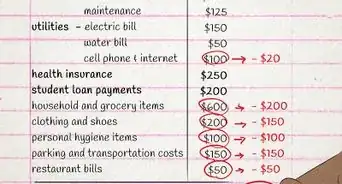This article was co-authored by Adam Dorsay, PsyD. Dr. Adam Dorsay is a licensed psychologist in private practice in San Jose, CA, and the co-creator of Project Reciprocity, an international program at Facebook's Headquarters, and a consultant with Digital Ocean’s Safety Team. He specializes in assisting high-achieving adults with relationship issues, stress reduction, anxiety, and attaining more happiness in their lives. In 2016 he gave a well-watched TEDx talk about men and emotions. Dr. Dorsay has a M.A. in Counseling from Santa Clara University and received his doctorate in Clinical Psychology in 2008.
There are 11 references cited in this article, which can be found at the bottom of the page.
wikiHow marks an article as reader-approved once it receives enough positive feedback. In this case, 92% of readers who voted found the article helpful, earning it our reader-approved status.
This article has been viewed 66,338 times.
Marriage to a narcissist can feel like one long and confusing emotional roller-coaster ride. All of your attention goes to your spouse, yet they constantly criticize you for not meeting their needs. You may feel like you must tiptoe around, making sure you say exactly the right thing so as not to tick them off. Manage your narcissistic marriage by knowing what behavior patterns define the narcissist; helping your spouse (if willing) get help; using strategies to cope with this behavior; and learning to care for your own emotional needs.
Steps
Recognizing True Narcissism
-
1Watch for self-inflated comments and behaviors. A grandiose sense of self-importance is one of the most identifiable traits of the narcissist. Individuals with narcissistic personality disorder believe that they are elite and special. They may select their friends and acquaintances based on their status or popularity. They may also go out of their way to make important contact as it cements their perceptions of themselves.[1]
- Narcissists often make grandiose promises to people and lie about good deeds they've done.
- They will have often left a series of tragic relationships in their wake.
- If your spouse is a narcissist, you may have felt as if they act like they are better than you or those around you.
- This can lead to you feeling insignificant and even suffering from low self-esteem.
-
2Be on the lookout for extreme reactions to criticism. Narcissists portray a unique dynamic when it comes to criticism. They are extremely sensitive to the criticism of others, yet they themselves are incredibly critical. Because narcissists are naturally arrogant, your spouse may act as if they know it all. You may receive the brunt end of this behavior as they attack various aspects of your character or appearance.
- Even if you offer constructive criticism to your spouse, they may respond negatively.
- Although they may appear to have high self-esteem, you probably notice that it is fragile.
- They may become incredibly angry or even violent when criticized.[2]
- They will also withhold love and affection if you criticize them, disagree with them, or do not give them exactly what they want.
Advertisement -
3Notice a lack of empathy. Narcissists have a hard time feeling compassion or concerns for others. You will often find yourself having to explain basic human decency to a grown adult. This is a warning sign. Your spouse’s #1 priority is themselves. Everything is “me” or “I.” They seem to have very little insight into your emotional needs and are unable to show empathy when you are upset.[3]
- The narcissistic spouse may also lack an ability to recognize your feelings, interests, or personal values.
- You might say, “That was selfish of you and it hurt my feelings.” They will either be confused or say you’re too “sensitive.”
-
4Check for exploitative behaviors. Narcissists have no qualms about using others to get what they want. They may take advantage of acquaintances or family members to improve their own situation or advance in some way.
- You may have felt manipulated or used on various occasions in order for your spouse to achieve their goals.
- For example, your spouse may open credit cards in your name without you knowing, or use your social connections to advance their own status.[4]
Helping a Willing Spouse
-
1Share your concerns with your spouse. If your narcissist seems open-minded, bring up the topic of getting help. In many cases, narcissistic behavior patterns have led to problems in the narcissist's marriage, family, friendships, and career. Use one of these aspects as a benchmark to convince your spouse to get help.[5]
- For instance, if your spouse is very career-oriented, but has been struggling to work as a team player, you might use this as fuel for a conversation.
- "know you were hoping for a promotion this year, but you've been having trouble with the team at work."
- "I think it would be a great idea if you talked with someone who can help you build on the skills you already have to increase your odds of getting chosen for the position."
-
2Accompany your spouse to see a professional. Although it may seem like a good idea to search for a marriage therapist to help your spouse, avoid this dynamic in favor of having your spouse attend individual therapy. In many cases, couples therapy results in the narcissist playing the victim role, leading to very little change.[6]
- Instead help your partner find an individual therapist who has experience treating personality disorders.
- You don't have to share your suspicions about the specific disorder with your spouse, but this increases the odds of them being diagnosed and treated.
- Be sure to let the therapist know about your suspicions. Don't let your spouse find out though or they could become angry.
-
3Be supportive. Refrain from trying to steer your spouse into treatment one way or another. Treatment for personality disorders like narcissism require long-term, intensive one-on-one therapy, and your spouse must be a willing participant. However, it can be helpful to ask how you can show support as they go through treatment.
- You might say, "Darling, I'm so proud of you for seeking help with what you're going through. What can I do to show my support or help you through this time?"
- Be open to your spouse's response. They may simply ask for space while they come to terms with the disorder.
-
4Participate in support groups. Since family members are often left to sort through their own emotional situation alone as the narcissist seeks individual treatment, you might find support by attending a local group or joining one online.
- Ask your spouse's therapist for a recommendation of a support group for loved ones of those with narcissistic personality disorder.
- You might also research forums online to locate other spouses or family members of narcissists.
- Spouses of narcissists may also benefit from seeing a therapist to resolve the emotional damage inflicted by their spouses and help them learn to cope.
Handling Unchecked Narcissism
-
1Know that the majority of narcissists never get treated. Narcissistic personality disorder involves a long-term and enduring behavior patterns. This condition must be diagnosed and treated by a qualified mental health professional such as a psychologist or psychiatrist. Unfortunately, an overwhelming majority of narcissists never seek treatment.[7] Without treatment, it is unlikely that the narcissist will get better.
- Your spouse may only see a professional when the consequences of their behavior significantly interferes with their ability to function at work, at home, or socially.
- You might try talking to your spouse about getting help, but expect resistance.
-
2Stop taking their behavior personally. If you are going to try to make your marriage work with a narcissist, then you will need to build an emotional wall around yourself. Because the narcissist’s behavior is purely self-driven, it’s important to recognize it as a part of the disorder and not take it personally.[8]
- This will undoubtedly be difficult to do, but it is necessary if you want your marriage to work.
- When your spouse says or does something particularly offensive or exploitative, recite a mantra to yourself like “What they do is a reflection of them, not of me.”
-
3Don’t expect your spouse to meet your emotional needs. Narcissists are a classic example of being takers rather than givers. Your spouse requires a great deal of admiration and/or affection, but they are unlikely to provide the same to you unless it serves them in some way. Expect for the relationship to be out of balance.[9] Instead, use your friendships and relationships with family members for emotional support.
-
4Use flattery before making requests. Your narcissistic spouse likely responds well when you pump up their ego, so try this tactic when making demands on them. That way, you are able to keep your spouse satisfied and see to it that your own needs are met also.
- “Darling, I know you are super busy, but your amazing carpentry skills are needed in the garage."[10]
-
5Praise positive behaviors. Positive reinforcement may also be helpful when trying to deal with a narcissistic spouse. Your husband or wife wants to be reminded of all the things they’re good at, and they can barely handle learning about their shortcomings. So, try your best to ignore the undesirable behaviors, and when you see them doing something helpful, be sure to praise them.[11]
- When your wife asks “How was your day at work?” you might kiss her forehead and say, “How wonderful is it for you to ask that?”
- This reinforces the likelihood that she will inquire about your feelings in the future.
Caring for Yourself
-
1Regain your identity by pursuing passions. When you’re married to a narcissist, self-care should be a #1 priority. It’s important for you to take part in activities that make you feel good about yourself and connect you with positive people. Narcissists often try to isolate you from other people, which may make it hard to maintain your relationships. You may also find that it is hard to keep up with your interests because you are trying to keep the peace at home.
- Think about some activities that you have put off since becoming married, or have been dying to try out.
- Sign up for a class, go to a Meetup, or check a book out from the library to learn more about a specific interest.
- You might learn a language, start crafting, become a writer, or start taking kickboxing. Do something you love, just for you.
- To ensure that your time away doesn’t create a sore spot for your attention-hungry spouse, check in often while you’re engaging in hobbies.[12]
-
2Develop realistic personal goals for yourself. Marriage to a narcissistic spouse can feel like everything is about your partner while nothing is about you. Combat feelings of inadequacy by giving yourself permission to be a little selfish and set some goals you have been secretly harboring.[13] To make sure you achieve them, make them SMART goals—that is, specific, measurable, attainable, realistic, and time-bound.
- Have you always wanted to go back to school? Make a list of steps you must take to reach this goal.
-
3Surround yourself with a positive network. Just because your spouse isn’t attending to your emotional needs doesn’t mean no one can. Find a trusted friend or confidant to share your feelings and experiences with. Spend time with people who value who you are as a person and give as much as they take.
- “Hey, Randy, some things have been happening in my marriage and I could really use someone to talk to. Can I trust you to keep this between us?”
- If you don’t have a trusted person to talk to, try attending a support group for loved ones of narcissists.[14]
-
4See a professional therapist. Although it can make your marriage more fulfilling if your spouse gets treatment, it can also be helpful if you see a professional as well. Years of belittling, criticizing, and being put in second place can take a toll on your self-esteem, leading to anxiety and depression.
- Research a therapist in your area who has experience working with the spouses of narcissists. Interviews several professionals before selecting one you feel comfortable with.
- Seeing a therapist can also help you learn more about the disorder affecting your spouse and learn more skills about how to cope with it in your marriage.[15]
-
5Consider ending the marriage if your spouse becomes violent. You may be completely against divorce, but you should reconsider your decision if your spouse starts to abuse you. Although many narcissists never become violent, it can happen. Speak with a professional to develop an action plan to follow in times of crisis.
- Even if your spouse never physically abuses you, narcissistic abuse still involves emotional and mental abuse.
- Talk to your therapist to weigh the pros and cons of leaving your marriage, especially if you have children.[16]
Expert Q&A
Did you know you can get expert answers for this article?
Unlock expert answers by supporting wikiHow
-
QuestionHow does being married to a narcissist affect you?
 Adam Dorsay, PsyDDr. Adam Dorsay is a licensed psychologist in private practice in San Jose, CA, and the co-creator of Project Reciprocity, an international program at Facebook's Headquarters, and a consultant with Digital Ocean’s Safety Team. He specializes in assisting high-achieving adults with relationship issues, stress reduction, anxiety, and attaining more happiness in their lives. In 2016 he gave a well-watched TEDx talk about men and emotions. Dr. Dorsay has a M.A. in Counseling from Santa Clara University and received his doctorate in Clinical Psychology in 2008.
Adam Dorsay, PsyDDr. Adam Dorsay is a licensed psychologist in private practice in San Jose, CA, and the co-creator of Project Reciprocity, an international program at Facebook's Headquarters, and a consultant with Digital Ocean’s Safety Team. He specializes in assisting high-achieving adults with relationship issues, stress reduction, anxiety, and attaining more happiness in their lives. In 2016 he gave a well-watched TEDx talk about men and emotions. Dr. Dorsay has a M.A. in Counseling from Santa Clara University and received his doctorate in Clinical Psychology in 2008.
Licensed Psychologist & TEDx Speaker If you're in a relationship with a partner who possesses narcissistic traits, you may struggle to identify your emotions, and you may also have difficulty asserting yourself in relationships. This often happens because you become accustomed to attending to your partner without attending to your own internal experiences.
If you're in a relationship with a partner who possesses narcissistic traits, you may struggle to identify your emotions, and you may also have difficulty asserting yourself in relationships. This often happens because you become accustomed to attending to your partner without attending to your own internal experiences.
References
- ↑ http://psychcentral.com/disorders/narcissistic-personality-disorder-symptoms/
- ↑ http://www.professional-counselling.com/how-to-deal-with-a-narcissistic-partner.html
- ↑ http://psychcentral.com/disorders/narcissistic-personality-disorder-symptoms/
- ↑ http://www.mayoclinic.org/diseases-conditions/narcissistic-personality-disorder/basics/symptoms/con-20025568
- ↑ http://www.huffingtonpost.com/dr-craig-malkin/7-strategies-for-dealing-_b_5192851.html
- ↑ https://letmereach.com/2014/12/12/why-therapy-with-narcissist-is-a-bad-idea/
- ↑ http://psychcentral.com/disorders/narcissistic-personality-disorder-symptoms/
- ↑ http://www.professional-counselling.com/how-to-deal-with-a-narcissistic-partner.html
- ↑ https://www.firstwivesworld.com/index.php/my-narcissistic-ex-husband/item/8134-staying-in-and-surviving-a-narcissistic-marriage
- ↑ http://thenarcissisticlife.com/married-to-a-narcissistic-husband-proceed-with-caution/
- ↑ http://thenarcissisticlife.com/married-to-a-narcissistic-husband-proceed-with-caution/
- ↑ http://thenarcissisticlife.com/married-to-a-narcissistic-husband-proceed-with-caution/
- ↑ http://www.psychalive.org/narcissistic-relationships/
- ↑ http://outofthefog.website/personality-disorders-1/2015/12/6/narcissistic-personality-disorder-npd
- ↑ https://www.psychologytoday.com/blog/sense-and-sensitivity/201209/acceptance-is-key-dealing-narcissist
- ↑ https://www.psychologytoday.com/blog/the-creativity-cure/201408/if-you-are-the-target-narcissistic-abuse
About This Article
It can be frustrating to be married to a narcissist, but you can handle it by getting them help and taking care of yourself. People with true narcissism will make grandiose promises to people, lie about good deeds they’ve done, act like they are better than you, and have extreme reactions to criticism. If your spouse has any of these characteristics, share your concerns with them to encourage them to get help. Try to frame it so they understand how it will help them specifically. For example, you could say “Sweetie, I know you’ve been having trouble with the team at work, but if you talked with someone, it might help your chances of getting that promotion.” If your spouse doesn’t want to get help or refuses to acknowledge their behavior, focus on caring for yourself. Take time to focus on your hobbies and interests, which will help you de-stress. Additionally, find a trusted friend to share your feelings and experiences with. Keep in mind that some narcissists can be hurtful people, so if your spouse is abusing you mentally or emotionally, seek help. For more advice, like how to praise your spouse’s positive behavior, read on.















































































